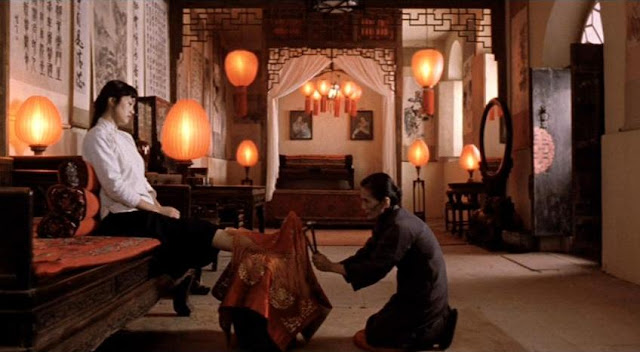RAISE THE RED LANTERN
A film by Zhang Yimou
1991 / China/ 125
minutes /
5.45pm / 25th
Oct 2015 / Perks Mini Theater
http://konangalfilmsociety.blogspot.in/
The film takes place within the gray stone and tile walls of
the Chen complex, where the master lives in the central house and each of the
four mistresses has a house of her own opening onto a central courtyard. Much
of the action takes place on the rooftops, which link in a labyrinth of
passageways and stairs, and include an ominous little house where, it is said,
women have died--but in the past, of course.
The first three mistresses live in uneasy balance when the heroine
Songlian arrives, and she becomes a catalyst for trouble. She learns that when
the master selects the mistress he will favor for the night, a red lantern is
placed outside her house. (The man who has the duty of announcing the nightly
position of the lantern is puffed up with drama and importance.)
The lucky
mistress then receives a foot massage and is allowed to determine the menu for
the next day. There is great competition to be selected, and Songlian
eventually discovers intrigues within intrigues--even learning that she cannot
trust those she thinks are her friends.
We know that rape is a crime of violence, not sex, and
"Raise the Red Lantern" illustrates that, because these women are all
essentially being raped as an effect of their position in a male-dominated
society that holds them as economic captives. So the movie wisely focuses not
on the sex itself, but on the situation that regulates and values it.
Strange,
how these women bow so completely to their situation, the will of the master,
and to the "customs" of the family. There may be a feminist message
here, but it is concealed well within the surface drama of the story."Raise
the Red Lantern" is told so directly and beautifully, with such
confidence, with so little evidence of compromise.
(Excerpts from Roger Ebert’s review)
Zhang Yimou
Zhang Yimou is an internationally acclaimed director working
in the People’s Republic of China. He is one of the most prolific, versatile
and significant of these Fifth Generation directors. His signature as a
filmmaker is a storytelling mode dominated by visual display, especially of his
female stars. This display is part of a complex picture of generation and gender
in Zhang’s work that reaches back to debates on Chinese modernity in the early
20th century.
Zhang was born in Xi’an in 1951 . He grew up in socialist
China where class struggle dominated life and literature. Like many young
Chinese of the time, he was sent to farms and factories during the Cultural
Revolution and so gained grass-roots knowledge of life in China. His
directorial debut, Red Sorghum (1987), was also the first Fifth Generation film
to capture a domestic mass audience and it catapulted him and his star, Gong
Li, to local and international fame. It is widely recognised that Zhang’s
visual imagery redefines the politics of Chinese self and identity. In the
first decade, this imagery focused on the sexual power, reproductive continuity
and spectacle of the female body onscreen.
Nevertheless, we could say that Zhang Yimou himself is a son
of China whose filmmaking gazes at past, present and future through the “son”.
In this sense, generation and gender are equally important in his films although
the visual and often spectacular focus is on his female leads. Zhang does not
claim that his films document China or its people; he creates fictional worlds
through moving images that often defamiliarise, shock, seduce, and subvert. He
documents desire instead, circulating themes that have long haunted the
national psyche and using seductive image-ideas that marry reality, dream and
nightmare. (From Senses of Cinema)















